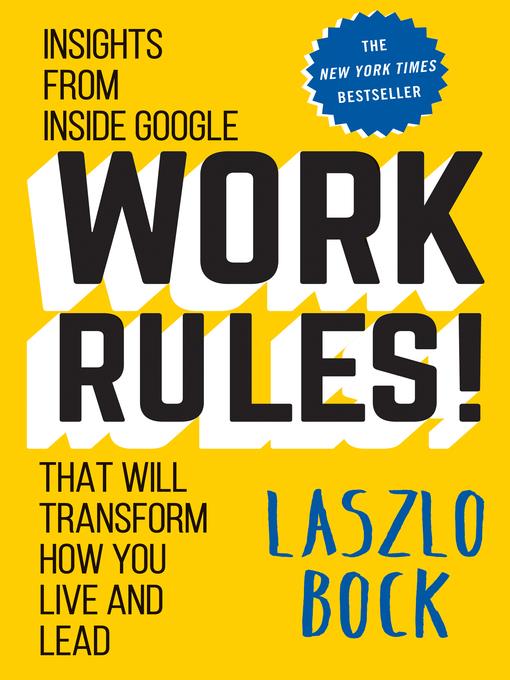
Work Rules!
Insights from Inside Google That Will Transform How You Live and Lead
کتاب های مرتبط
- اطلاعات
- نقد و بررسی
- دیدگاه کاربران
نقد و بررسی

January 19, 2015
Bock, Google’s head of people operations, debuts with a book about how Google hires and manages its employees. Most people know about the company’s free lunches and shuttle services, but, according to him, there is more behind Google’s five-time Fortune ranking as “Best Company to Work For.” The company aims to “keep people in an environment of freedom, creativity, and play.” However, there are rules underlying this culture, and values underlying these rules, to each of which Bock devotes one of the book’s 14 chapters. Its bedrock is trust in the fundamental goodness of people. Some rules are easier to accept than others. For example, “given limited resources, invest your HR dollars first in recruiting.” Less obvious is, “Swallow hard and pay unfairly.” No matter the rule, however, its explanation is thorough. Regarding pay, Bock cites a “power law distribution” that proves “your best people are better than you think, and worth more than you pay them.” This book is for those who are curious about Google, but especially for business leaders, all of whom, according to Bock, would benefit from adopting these rules themselves. Anecdotes about Google’s founding and history mingle with discussions of management theory, psychology, and behavioral economics to create a fascinating and accessible read. Agent: Amanda Urban, ICM.

January 15, 2015
The head of "People Operations" at Google discusses how the company grew into a world leader in its field and why economics was not necessarily the primary driver of its development.Bock's account of the company's origin and growth challenges traditional top-down business models based on monetary incentives and bonuses to mobilize and motivate employees in pursuit of corporate goals. As the author tells it, "Googlers" have built a self-replicating culture of continuous innovation and improvement, from the eponymous search engine to Android phones and operating system and self-driving cars. Trust is at the company's core. Each of their highly qualified employees is free to contribute their best and help others solve problems, transparently, with research supported by rigorously tested data. "Inside Google," writes the author, "we don't have a lot of rule books and policy manuals." Nonetheless, Bock offers his own interpretation in the form of 10 work rules that can help transform a workplace into a "high freedom environment." These include giving your own work meaning, focusing on turning overperformers into teachers and working with underachievers to do better, not confusing development with managing performance, and being both frugal and generous. Bock insists that "culture eats strategy for breakfast," and he dismisses the "up or out model of management" associated with former GE head Jack Welch-this scheme rigorously ranks workers annually and dumps the bottom 10 percent. As Bock shows, Google couldn't afford the luxury of wasting one of its largest investments: the associates. Compensation, promotion policy, management practices and performance management are all designed to foster associates' contributions to building a "learning institution." A perfect example is Google, writes the author, which is "twenty five times" more exclusive than Harvard and "profoundly suspicious of power." An intriguing profile of an innovative company that continues to shake up the world.
COPYRIGHT(2015) Kirkus Reviews, ALL RIGHTS RESERVED.

November 15, 2014
Billed as Lean In for every manager, this is good guidance from the head of Google's innovative People Operations, who wants to show companies how to attract and keep the best managers. His tips might unsettle: take away managers' power over employees, pay unfairly, and trust data (not your gut) to predict and shape the future. With a 200,000-copy first printing.
Copyright 2014 Library Journal, LLC Used with permission.

Starred review from February 15, 2015
Who's not curious about what makes Google a worker's paradise and a household word among profitable businesses? Agreeing with Ron Friedman's (The Best Place To Work) contention that gains in job satisfaction and concomitant increases in innovation and productivity are within the reach of every organization--regardless of funds available for employee perks--Google's top human-resources professional, Bock, offers tips from management research and examples gleaned from experience to illustrate how "the best way to arrive at the beating heart of great management is to strip away all the tools on which most managers rely." Readers persisting after the preface's assault on conventional management theory and practice stand an excellent chance of emulating Google's success in attracting, developing, and retaining employees who Bock characterizes as "the most talented people on the planet." Counterintuitive chapter titles include "Don't Trust Your Gut" (advocating use of structured interviews over subjective measures and methods not predictive of future performance) and "Pay Unfairly" (explaining how rigid pay structures can motivate highest performers to quit). Each section concludes with three-to-four takeaways encapsulating the author's message. VERDICT Bock makes a persuasive case for ceding power to individual employees and teams. For visionary managers. [See Prepub Alert, 10/27/14.]--Elizabeth Wood, Bowling Green State Univ. Libs., OH
Copyright 2015 Library Journal, LLC Used with permission.

























دیدگاه کاربران